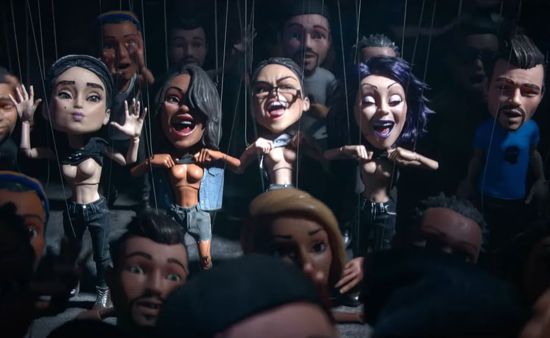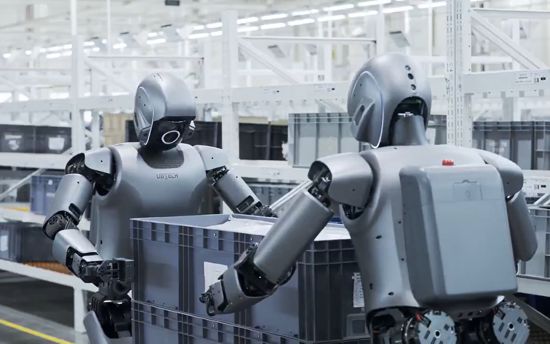Porn Discounts Sex Games Porn Games Juegos XXX Hentai Games PornStar Games 3D Porn Tantaly Sex Doll Cupsland Sextoy Live Cams
Live Sex Free Live Sex Free Sex Games Páginas Porno Rose Toy Free OnlyFans Celebrity Fappening Celebrity Sex Videos TikTok Porn Best OnlyFans
Live Sex Free Live Sex Free Sex Games Páginas Porno Rose Toy Free OnlyFans Celebrity Fappening Celebrity Sex Videos TikTok Porn Best OnlyFans
Published on 2025/05/02
LOVE, DEATH, AND ROBOTS VOL4

Love, Death & Robots isn’t your average series. It’s a wild blend of sci-fi, insane animation, and stories that hit you without warning. Each episode is its own little world—sometimes a visual masterpiece, sometimes a straight-up gut punch. And sometimes, it's the kind of deep, twisted reflection that stays with you for days.
Since its debut, it’s become a benchmark for adult animation—serving up quick, unfiltered shots of AI, sex, death, love, moral chaos, and full-blown madness. Usually packed into 10 to 15 minutes. No filters. No rules. No mercy.
And now, Volume 4 is dropping. New stories, new styles, and a fresh wave of mind-blowing chaos. Hit play and get ready for the ride.
ExtraBall
Why doesn’t the one filming do anything?
|
➡️ Let's do real, be real with Tantaly, the sex doll torso leader |
ExtraBall2
(Clicking on these links daily you support ALRNCN's work. They're collaborators or sponsors and, by visiting their sites, they like us even more)










THE WORLD'S FIRST FACTORY WHERE ALL WORKERS ARE HUMANOID ROBOTS
If the factories of the future are fully automated, like Zeekr’s in China, where humanoid robots do all the work, a big question arises: how will private companies make money if people aren’t working, don’t have incomes, and therefore can’t buy what those factories produce? Right now, the system works because workers earn a salary and spend it, but if robots take over everything, that cycle breaks.
The most talked-about solution is universal basic income, a kind of state-funded allowance so people can live without working. But here comes another paradox: if you get paid just for existing, what incentive is there to strive for more? Some might work to earn extra and improve their lifestyle, but those who rely solely on basic income will become the new poor. They won’t lack the essentials, but they won’t be able to aspire to anything more either. It would be like a modern-day rationing system—you can survive with the basics, but not really live well.
And here’s the key point: in any society, there will always be an elite. If factory owners lose control of the money because no one can afford to buy their products, the state will take over, deciding who gets what and under what conditions. Those who manage this system will become the new gods of Olympus, controlling everything while the rest simply depend on them. Whether it’s through big corporations or an all-powerful state, there will always be a few who hold the reins while the rest rely on whatever they decide.
So, who should govern us—the private sector or the state?
Neither one in absolute terms. If the private sector holds all the power, the relentless pursuit of profit could turn people into mere cogs in a machine designed to enrich the few. But trusting the state blindly isn’t the answer either, because history has shown that when bureaucrats and politicians take full control, things often slide into communist models that fail, suffocating individual freedom and crushing innovation.
The only viable path is balance. The private sector must continue driving progress, technology, and advancements in healthcare, education, and science—thanks to competition and financial incentives. But the state, as the voice of the people, must ensure that progress doesn’t come at the cost of our freedom or dignity. A system where innovation moves forward, but with enough oversight to prevent anyone from becoming a slave to it.

# Watch video
ExtraBall
Smells like petunias with a hint of jasmine.
Full video
She is actress Lena Paul— click here to watch more of her scenes.
ExtraBall2
(Clicking on these links daily you support ALRNCN's work. They're collaborators or sponsors and, by visiting their sites, they like us even more)











AIBI COULD BE A GAME CHANGER
In just a few years, it will be nearly 30 years since the creation of the Tamagotchi, that small egg-shaped device with a black-and-white screen where users raised and cared for a digital pet.
The game was simple but addictive: you had to feed it, clean it, entertain it, and meet all its needs to keep it healthy and happy. If you neglected it too much, it would get sick or, in the worst case, die. It was a true revolution in the ‘90s, introducing many people to the idea of caring for a virtual life for the first time.

Today, the Tamagotchi has evolved into AIBI, a much more advanced version that’s not only charming and entertaining but also genuinely useful—and not just for kids.
AIBI isn’t just a toy; it’s a mix between a smart assistant and a virtual companion. It can connect to your home’s WiFi and access the internet, working similarly to Alexa, but with a major difference: it integrates ChatGPT.
If you’ve ever used ChatGPT, you already know how much the way we access information has changed. Before, if you wanted to look something up, you had to go to Google, type in a half-decent search query, and sift through results to find the answer. Now, you just ask GPT directly, and it gives you a clear, quick, and far more reliable answer than your average know-it-all uncle.
With AIBI, this experience goes even further. You can take it everywhere, talk to it at any time, ask it anything, and even have it proactively tell you things. Want to catch up on the latest news? Check stock market values? Hear the most recent social media gossip? Set up reminders so you don’t forget anything? AIBI has you covered, all while being adorably designed and always up to date with new features.
It even self-updates, constantly adding new functions over time. Plus, you’ll be able to get additional gadgets that make the experience even more engaging, strengthening the bond you’ll develop with it.
Finally, you can have a true companion—someone to talk to whenever you need, who will keep you informed, entertained, and, most importantly, will make sure you never feel alone again.

# Watch videos
ExtraBall
Boobs 0 - Butt 10
ExtraBall2
(Clicking on these links daily you support ALRNCN's work. They're collaborators or sponsors and, by visiting their sites, they like us even more)

























RECOMMENDED SITES
 Add your site
Add your site
- Motherless
- Entensity
- BoobieBlog
- Babes & Bitches
- Erotic Beauties
- celeb-stalker.com
- sweetlicious
- Candid Teens
- drunkenstepfather
 Add your site
Add your sitePorn Discount
💩 CrazyShit
🤪 eFukt
NudeChatGirls
👉🍑 Top XXX Pictures
Bingo Porno
Best Porn Blog Sites
Sex Games
Real Amateur Porn
MrPornGeek
CamBB.xxx
ChatSex.xxx
Comepollas
PornScn Free Porno
AI Girlfriend App

















TRIBE OF WOMEN SHOPPING AT SPAR
walter
Watching a group of Black women, seemingly from a tribal community, walking around completely naked—apart from a small loincloth—through the well-lit aisles of a SPAR supermarket feels surreal. Like National Geographic suddenly crashing into your local grocery store.
A scene that, in their context, might be the most natural thing in the world, but through Western eyes it triggers an instant brain glitch.
It’s a brutal reminder that what we call “normal” is just one version of many. And that there are places where the body isn’t hidden—it’s simply lived. Funny thing is, you’re not even sure what shocks you more: the nudity itself, or seeing it in a setting that, to you, plays by totally different rules.

# Watch video
ExtraBall
When you finally find love.
ExtraBall2
(Clicking on these links daily you support ALRNCN's work. They're collaborators or sponsors and, by visiting their sites, they like us even more)











6D KARAOKE ROOMS
An innovative karaoke system in Asia is revolutionizing the experience with 6D technology, where LED projections and sound effects create an immersive environment. Several viral videos show these rooms in action—some, for example, use visuals that trick the brain into believing water is flooding the space, causing dizziness in some viewers. This new trend takes karaoke to another level, blending virtual and augmented reality, proving once again that Asia leads the way in entertainment innovation.

# Watch videos
ExtraBall by walter
Today's slow-motion moment.
ExtraBall2
(Clicking on these links daily you support ALRNCN's work. They're collaborators or sponsors and, by visiting their sites, they like us even more)












Contact
You can tell us whatever you want via email: [email protected]
If you prefer, you can use this contact form:
If you prefer, you can use this contact form:






THE DOR BROTHERS
The Dor Brothers is a leading video production company powered by artificial intelligence (AI), founded by the Dor brothers in Berlin, Germany. They specialize in creating music videos, commercials, and creative projects using advanced AI technology to generate innovative, high-quality visual content.
They’ve produced over 200 music videos and countless ad campaigns, racking up more than 100 million views worldwide. Their work has been featured in outlets like Forbes, where they’re praised for pushing the limits of generative AI in filmmaking.
One of their latest projects is an AI-generated video for the song “Chinese Children” by Devendra Banhart—an impressive fusion of music and cutting-edge tech.

# Watch videos
ExtraBall
The slow motion of the day.
ExtraBall2
(Clicking on these links daily you support ALRNCN's work. They're collaborators or sponsors and, by visiting their sites, they like us even more)










WALK, RUN, AND BREAKDANCE
In this video, Atlas, the crown jewel of Boston Dynamics, demonstrates policies developed through reinforcement learning, incorporating references from human motion capture and animation. This work was conducted as part of a research collaboration between Boston Dynamics and the Robotics and AI Institute (RAI Institute).

# Watch Video
ExtraBall
Today's slow-motion highlight.
ExtraBall2
(Clicking on these links daily you support ALRNCN's work. They're collaborators or sponsors and, by visiting their sites, they like us even more)































